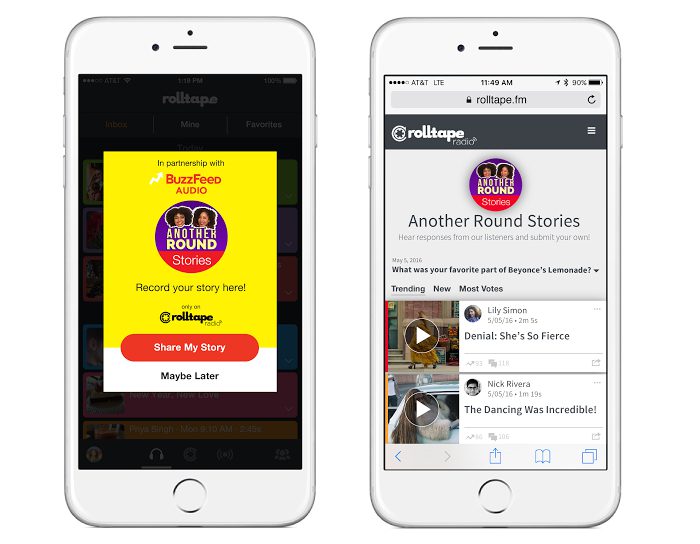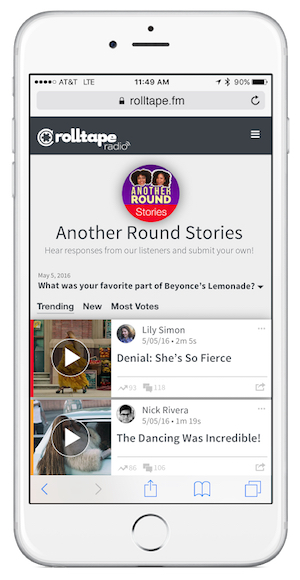
Whether it’s women sharing their stories of street harassment or kids offering tips on how to be a good older sibling, BuzzFeed’s popular podcast Another Round regularly solicits contributions from its listenership.
It currently asks listeners to submit audio clips by leaving a voicemail on a dedicated phone number or emailing the show a voice memo. But Another Round is trying to make it easier to submit audio to the show by partnering with Rolltape, a recently launched social audio app.
 A listener downloads the app, creates an account, and records their story directly into the app. “You can start and stop and it sounds completely seamless,” said Eleanor Kagan, BuzzFeed’s director of audio. The user then uploads the clip to a collection of stories where a producer can download it and incorporate it into the show.
A listener downloads the app, creates an account, and records their story directly into the app. “You can start and stop and it sounds completely seamless,” said Eleanor Kagan, BuzzFeed’s director of audio. The user then uploads the clip to a collection of stories where a producer can download it and incorporate it into the show.
Rolltape was launched last fall as an asynchronous audio messaging app. Users record a message, add a photo along with intro and outro music to their clip, and send it directly to their friends or other users. For now, the app is only available on iOS.
In April, the company added Rolltape Radio, which lets users record messages or short shows for public consumption — the app suggests users limit their clips to five minutes. Users have to record their messages in the app, but clicking on the Rolltape Radio section of the app takes you to a separate web page.
Another Round has a dedicated station in Rolltape Radio, and users will be able to submit their stories and messages directly to the podcast’s channel. The producers hope that the app will streamline the submission process and allow listeners to interact more with one another. Users can upvote and leave comments on clips that are submitted to Rolltape Radio.
“Any opportunity for our listeners to meet each other and talk to each other and recognize themselves in each other’s stories, or learn from each other, is a really powerful opportunity,” Kagan said. “I think that’s what the show has been doing for over a year: making listeners feel heard, and hopefully less alone. It gives other listeners the opportunity to learn, hear stories they’ve never heard before, and open themselves up to a new perspective. This definitely goes toward forwarding that goal.”
Kagan said the podcast might ultimately use the app to encourage listeners to submit longer clips, which she said Another Round co-host Tracy Clayton classified as “mini-podcasts.”
“It would be cool to try and encourage people to make their own mini-podcast episode,” she said. “I don’t know what the next step there would be, but the idea of using the tool to tell their own stories is definitely something we want to promote.”
Audio has long been considered a difficult medium to engage with socially, and Rolltape is far from the only startup to try and make audio more accessible for the masses.
Earlier this year another social audio app, Anchor, launched and began working with outlets including WNYC and Radiolab. In Anchor, users post short clips that others can reply to.Anchor and Rolltape face similar challenges. Users spend an average of 50 minutes per day on Facebook, Instagram, and Facebook Messenger. It’s a challenge to convince them to download and spend time in new apps.
Rolltape CEO and co-founder Jessica Taylor wouldn’t tell me how many users Rolltape has, but she hopes the partnership with Another Round will attract new users. Most of Rolltape’s current users are using the private messaging feature, not the public broadcasts.
 “We’re really excited, with this pilot partnership with Another Round, to see some new dynamics coming into play, and people maybe using it more to broadcast content,” Taylor said. “It may be that listeners will adopt some of the private messaging capabilities, which would be great, too.”
“We’re really excited, with this pilot partnership with Another Round, to see some new dynamics coming into play, and people maybe using it more to broadcast content,” Taylor said. “It may be that listeners will adopt some of the private messaging capabilities, which would be great, too.”
Rolltape initially approached BuzzFeed about working together, and it has developed a special interface that will take users directly to Another Round’s content and give them a quick tutorial on how to use the app.
Another Round is currently the only podcast working with Rolltape.
Taylor said she’d eventually like to work with other podcasts as well. “This is a big opportunity for podcasting to build more community and invite a more diverse conversation with our listeners,” she said.